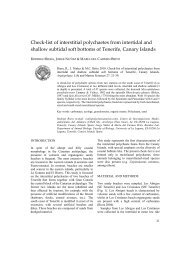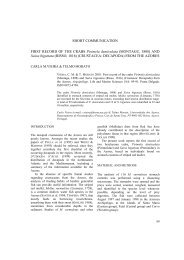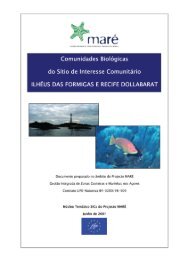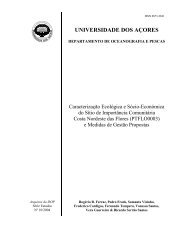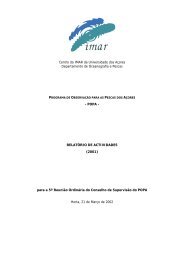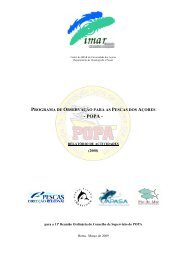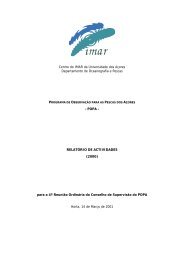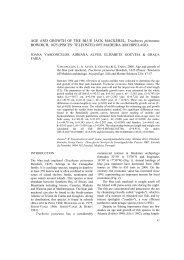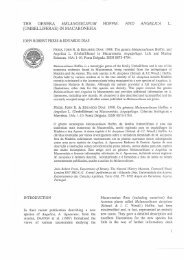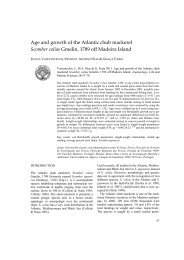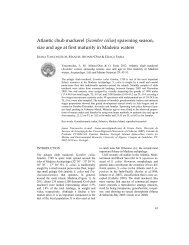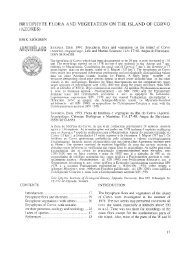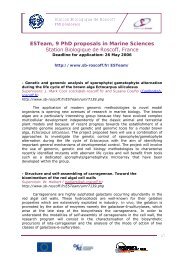relatório actividades de j - DOP/UAç - Universidade dos Açores
relatório actividades de j - DOP/UAç - Universidade dos Açores
relatório actividades de j - DOP/UAç - Universidade dos Açores
Create successful ePaper yourself
Turn your PDF publications into a flip-book with our unique Google optimized e-Paper software.
DELASS – Development of Elasmobranch assessments.<br />
UE – CFP – Study DELASS-CT99-055<br />
DELASS, Development of Elasmobranch Assessments is an international<br />
research project in which 15 European research institutes and 2 sub-contractors<br />
participate. The duration of the project is three years (2000 - 2002). The main<br />
objective of DELASS is the improvement of the scientific basis for the<br />
management of fisheries taking elasmobranches species. By the end of the<br />
contract period DELASS should provi<strong>de</strong> assessments of 7 species of North East<br />
Atlantic sharks and 2 rays species.<br />
National funding<br />
CORRAM - Octopod cephalopods: relation of the resources with marine<br />
environment.<br />
FCT - PRAXIS XXI / 2-2.1-MAR-17071-95<br />
This project aims to obtain basic biological information on commercial<br />
cephalopods from Portuguese coast, mainly on common-octopus, that<br />
represents the 2nd and 3rd most important species in economic value in the<br />
national fisheries. The core of the project, common to all participants, concerns in<br />
collecting simultaneously biological data (fisheries, reproduction, growth, feeding)<br />
on the common- octopus in different geographic areas from mainland Portugal<br />
(Viana do Castelo, Cascais e Tavira), Azores and Ma<strong>de</strong>ira, at least during an<br />
year, based in monthly samplings. At same time, each of the participants will<br />
conduct research in other subjects as experimental fishing, suitability of<br />
assessment mo<strong>de</strong>ls to cephalopod resources, population genetics, physiology,<br />
eco-toxicology, abundance and distribution studies in relation with environmental<br />
factors. In the end of the project it is expected to have biological information that<br />
could contribute for a better management of the national cephalopod resources.<br />
Trophic ecology and population structure of juvenile, pelagic stage loggerhead<br />
sea turtles (Caretta caretta) in the North Atlantic Ocean.<br />
FCT - PRAXIS XXI / P-BIA-11310-1998<br />
The project aims at increasing our knowledge on the little known biology of<br />
pelagic stage loggerhead sea turtles (Caretta caretta). These sea turtles provi<strong>de</strong><br />
a1 st mo<strong>de</strong>l organism to establish a research group and national and international<br />
network capable of studying the ecology and autecology of pelagic open ocean<br />
organisms.<br />
Research at Ma<strong>de</strong>ira and Azores focuses around the evolutionary reasons for<br />
the existence of a pelagic life history phase for turtles. Given the unpredictability<br />
in space and time of food resources in the open ocean, it is strange that<br />
loggerhead sea turtles should use these areas as <strong>de</strong>velopmental habitat to cover<br />
increased energetic <strong>de</strong>mands for their growth. The intention is to address this<br />
question through an "optimal foraging-energetic budget" approach, that will<br />
8



